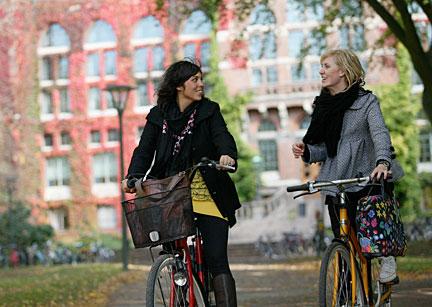Swedish News:
Easier for Moslems to fast in Norrland. New laws to reduce under-the-table work. Bike thefts.
-
 Moslems in the north of Sweden are confused when it comes to fasting during Ramadan in a place where the sun doesn’t set.
Moslems in the north of Sweden are confused when it comes to fasting during Ramadan in a place where the sun doesn’t set. -
-
Easier for Moslems to fast in Norrland
In the past, the endless midnight sun in northern Sweden has caused confusion among Moslems — who, during Ramadan, must fast until sunset. There have been no clear directions regarding when it is OK to break the fast at these latitudes. However, now the European Council for Fatwa and Research (ECFR) has issued some guidelines, such as to follow the light in either Stockholm or Malmö, or to go back to the last day when it was dusk and dark, which is May 1. Now the Moslems in Västerbotten do that and fast between 3:11 a.m. and 9:03 p.m. “Before, when there weren’t that many Moslems in Sweden, this was not a big problem, says Mahmoud Khalfi, imam at the Islamiska Förbundet (the Islamic Association). “But these past years it’s become a problem. There have been many bids on what to do. Should one follow Mecca or should one fast during all the daylight hours?” However, the new guidelines aren’t entirely clear. “Next year we hope for a uniform solution,” says Khalfi. Ramadan, the ninth month of the Islamic calendar, starts in the evening of June 28 and ends in the evening of July 28, and means that Moslems throughout the world fast from dawn until sunset. This annual observance is regarded as one of the Five Pillars of Islam. The month lasts 29 to 30 days based on the visual sightings of the crescent moon. -
 New laws are proposed in order to reduce undeclared work in Sweden’s construction industry.
New laws are proposed in order to reduce undeclared work in Sweden’s construction industry. -
-
New laws to reduce under-the-table work
The Swedish government wants to reduce undeclared work and promote competition within the construction industry via so-called staff ledgers, according to a council on legislation. The changes mean that the developer must report a construction activity to Skatteverket (the Swedish Tax Agency), so that an electronic staff ledger can be kept at the work site. Skatteverket will also be able to make unannounced control visits to the building site. If a company breaks the rules, a control fee will be charged. The proposal is welcomed by the construction industry. “With staff ledgers in the industry, we get one of the important tools in place in order to strengthen a healthy competition and it will combat financial crime,” says Peter Löfgren, developmental director at Sveriges Byggindustrier. -
 If you’ve ever lived in Sweden, you probably owned a bike; if you ever owned a bike there, chances are it was stolen. Bike thefts make up 5 percent of all reported crimes, and last year over 66,000 bike thefts were reported. Now police in Västerås work to have that changed. Above two women biking outside Lund’s University Library. Lund is a town in which almost everyone bikes, and where bikes are everywhere to be found.
If you’ve ever lived in Sweden, you probably owned a bike; if you ever owned a bike there, chances are it was stolen. Bike thefts make up 5 percent of all reported crimes, and last year over 66,000 bike thefts were reported. Now police in Västerås work to have that changed. Above two women biking outside Lund’s University Library. Lund is a town in which almost everyone bikes, and where bikes are everywhere to be found. -
Bike thefts
The number of bike thefts increased dramatically in Sweden during the first five months of the year. Stolen bicycle reports increased 28 percent over the same period last year. Bike thefts in Sweden are very common and make up 5 percent of all reported crimes, according to statistics from Brottsförebyggande rådet (Brå or The Swedish National Council for Crime Prevention). In order for a person to be judged in court, he or she needs to be caught stealing the bike, but there are other methods to combat the problem. “It’s going to be time consuming, but if we make an effort we’ll be on our way,” says Fredrik Degerman, deputy director at the community police in Västerås. Together with Skåne and Örebro, Västmanland county is one in which bike thefts are most common in Sweden. Last year, over one hundred of the inhabitants reported bike thefts to police there. Degerman says the effort will continue throughout fall, and that even though the county tops the list of thefts, he believes the police in other cities can learn from his and his colleagues’ work. “We work with the municipality as well, and look at what the big bike parking spots look like. Together with the municipality, we want to make things harder for the thiefs,” says Degerman. Meanwhile, the outright thefts — many bikes are being “borrowed” for shorter rides to later on be dumped — have become more sophisticated. Last year, over 66,000 bike thefts were reported. The insurance company’s press officer Daniel Claesson, believes that a huge part of the increase in reports has to do with the fact that biking has become more popular. “The market, even the black market, has increased,” he says. -
-
